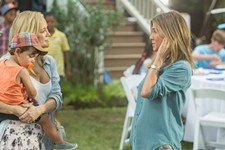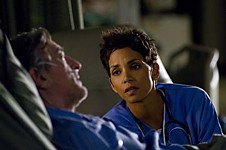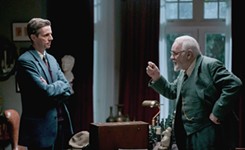Frankie & Johnny
1991, R, 118 min. Directed by Garry Marshall. Starring Michelle Pfeiffer, Al Pacino, Kate Nelligan, Nathan Lane, Hector Elizondo, Jane Morris.
REVIEWED By Steve Davis, Fri., Oct. 18, 1991
Frankie & Johnny is the “Eleanor Rigby” of movies: all the lonely people, where do they all come from? In opening up his two-character play Frankie and Johnny in the Clair de Lune, screenwriter Terrence McNally makes some pointed observations about a world in which human beings burrow inside emotional cocoons rather than make contact with the outside. Set primarily in a lower Manhattan greasy spoon where the waitress Frankie and the short-order cook Johnny work, the movie's focus is on their rocky little romance. (There are umpteen million stories in the Big City, and this is one of them.) In its first half, Frankie & Johnny is an episodic romantic comedy of opposites attracting; there's a real joy in watching the courtship of these lovers and the consummation of their undeniable attraction for one another. From there, however, the film begins to delve into the whys of Frankie and Johnny's troubles, but in a somewhat lopsided fashion: where Johnny's compulsive obsession with Frankie is only superficially explored, Frankie's marked fear of intimacy -- which is compounded by Johnny's well-meaning aggressiveness -- is the unquestionable focus of the movie's second half. Pfeiffer carries the film beautifully at this point, going from a woman who steadfastly refuses to let down her defenses to someone finally finding the resolve to trust another person with her heart. (Could it be that Pfeiffer -- who this reviewer stated hadn't an inkling of talent in a review of the 1982 bomb Grease 2 -- has become America's foremost film actress?) Although the character of Frankie is written as plain and unworldly, there's an intelligence in Pfeiffer that makes you wonder if there's more to Frankie than meets the eye. In a scene in which she tearfully confesses the emotional inertia she feels, her vulnerability is all the more heartbreaking because you know that she knows, deep in her soul, what she should and can do with her life. Thespic bravos also go to Nelligan, who goes way against type in the rold of a sassy waitress hot for a roll in the hay. (Her resemblance to TV sitcom character LaVerne DeFazio, who was played by director Marshall's sister Penny, is more than coincidental.) Equally fine is Lane as Frankie's best friend and neighbor, a likable gay man with a gift for the one-liner. Towards the end of Frankie & Johnny, McNally's script reveals its theatrical roots in its lengthy heart-to-heart dialogue between the troubled lovers. Although audiences may instinctively prefer that which precedes this one-on-one confrontation of the wills, this last segment is Frankie & Johnny at its most intriguing. Any discomfort it may cause is a tribute to the truth it speaks about this crazy thing called love.
A note to readers: Bold and uncensored, The Austin Chronicle has been Austin’s independent news source for over 40 years, expressing the community’s political and environmental concerns and supporting its active cultural scene. Now more than ever, we need your support to continue supplying Austin with independent, free press. If real news is important to you, please consider making a donation of $5, $10 or whatever you can afford, to help keep our journalism on stands.
Marjorie Baumgarten, April 29, 2016
Kimberley Jones, Dec. 9, 2011
Jan. 19, 2024
Frankie & Johnny, Garry Marshall, Michelle Pfeiffer, Al Pacino, Kate Nelligan, Nathan Lane, Hector Elizondo, Jane Morris









